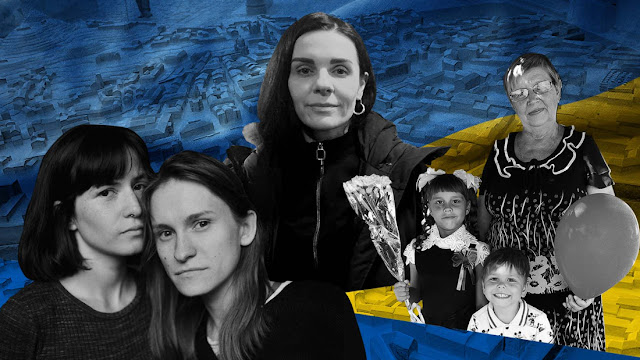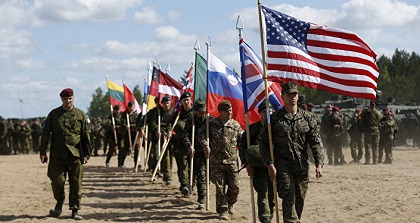Marina had a horrific epiphany while on a days-long, hectic cross-country train voyage to the northern city of Lviv, near Ukraine's border with Poland.
The 54-year-old caregiver, who was able to flee an orphanage in a besieged industrial town in eastern Luhansk province, had no method of returning to her own family.
Marina, who would not disclose her surname, was still reeling from the voyage — days spent desperately attempting to calm the panic-stricken youngsters in her care against the backdrop of Russia's horrific onslaught, while still afraid for her family back home.
The fracturing of families underpins many of the stories of displacement in Ukraine, where Russia's violent attempts to wrest control of territory in the country's east, south and center from Ukrainian authorities have leveled entire neighborhoods.
Millions of people are still trapped in besieged cities with virtually no way out. Establishing evacuation corridors out of hard-hit urban centers is proving elusive due to incessant violations of temporary ceasefires. Without safe passage, families are being ripped apart.
Several people said they have been unable to contact their loved ones since the start of the invasion. They described frenzied escapes from the country's worst-affected cities, in which parents, spouses, siblings and grandparents were left behind.
With the Russian assault knocking out power and telephone networks, whole cities have been cut off from the outside world. Many say they don't know if their loved ones are still alive.
"I don't understand why the government didn't try to evacuate us before the invasion started. I don't want to blame them. Still I can't help but think my predicament could have been avoided," Marina added.
Frantic attempts to reconnect with family
Once a tourist hotspot, Lviv is now ground zero for around 200,000 displaced Ukrainians who have flooded the city in search of relative safety. Several theaters and schools converted into makeshift shelters are now covered in mattresses for displaced people. Streets are clogged with traffic. Around nearly every corner people can be heard making teary phone calls to loved ones who stayed behind in war-ravaged areas.
Isabel Merkulova, 31, is a theater performer. These days she sits nervously by her phone, consumed with thoughts of her best friend Anastasiya Lisovska, who is trapped in Hostomel, north of Kyiv. The town has emerged as a key battleground in the war and has witnessed some of its most dramatic scenes -- including a showdown at an airport and the killing of its mayor
Anastasiya trekked to Hostomel from the Ukrainian capital shortly after Russia's invasion began in a bid to persuade her uncle to flee. By the time he came around, Russian forces had already laid siege to the city. At the time, she spoke defiantly about venturing over to her uncle's house as bombs rained down. She even entertained thoughts of joining the resistance. But fear quickly crept in.
The dripfeed of text messages from Anastasiya lighting up Isabel's phone -- punctuated by silences fueled by power shortages and telecommunication blackouts -- reveal the terrifying uncertainty wracking separated friends and family, who have no idea whether they might see each other again.
"It feels surreal that this was our life," she said.
After over two days of radio silence, Anastasiya resurfaced with news. By the candlelight of the bomb shelter, she and her neighbors had come to a decision. They would brave a 50-minute walk across the war-torn town to a collection point for evacuations. The government-organized evacuation corridor had failed the day before, but they were running out of food and water, and they had decided that the risk was worth it.
While some separated families have managed to maintain some communication across the hodge-podge of besieged cities, many more have become completely cut off from their loved ones. Iryna Lytvyn, 31, from the eastern town of Volnovakha, in Donetsk, hasn't spoken to her parents and sister, who stayed behind, in over a week.
"I don't know anything about my sister. The last time we saw her was February 27," said Lytvyn. "A week ago, someone saw her getting into the car with her husband, but since then, we didn't talk."











0 Comments